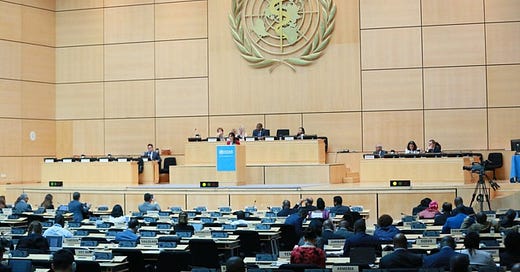Africa objects to US proposal on controversial IHR (WHO) amendments
Take Back Power
Meanwhile India discovers irregularities in WHO financial audit
In a rare show of African power and solidarity, several African member states objected to proposed International Health Regulations amendments, discussed at the World Health Assembly 75 this week – a move many believe might shake up the World Health Organization’s dominance.
A well placed source shared: “The resolution on IHR amendments was not passed at the WHA, as African countries were concerned that there was inadequate consultation amongst member states, and the process was being rushed. Botswana read the statement on behalf of the 47 AFRO members and I was personally present.”
According to Reuters, “if Africa continues to withhold support, it could block one of the only concrete reforms expected from the meeting, fraying hopes that members will unite on reforms to strengthen the U.N. health agency’s rules as it seeks a central role for itself in global health policy.”
The IHR seeks to define and detail WHO members’ obligations around public health emergencies and other health matters. The United States government proposed 13 controversial IHR amendments, which give the WHO DG Tedros unilateral power to declare actual or potential health emergencies and expect a response in 48 hours.
The draft proposal yet to be formally decided also aims to change article 59 of the IHR, and would accelerate the implementation of future amendments.
Bear in mind, a few countries at the WHA submitted draft resolutions to the IHR, which would need, at least according to the WHO process, four months to be considered. These countries are Australia, Bosnia and Herzegovina, Colombia, European Union and its Member States, Japan, Monaco, Republic of Korea, United Kingdom of Great Britain, Northern Ireland and the United States of America.
The African #WHA75 delegation expressed reservations about these IHR amendments, saying all reforms should be tackled together as part of a “holistic package” at a later stage.
“The African region shares the view that the process should not be fast tracked…,” Moses Keetile, deputy permanent secretary in Botswana’s health ministry, told the assembly on Tuesday on behalf of the Africa region.
“We find that they are going too quickly and these sorts of reforms can’t be rushed through,” said a concerned African delegate in Geneva. The U.S. mission in Geneva did not respond to a Reuters request for comment.
BRIMI emerges: Brazil, Russia, Iran, Malaysia and India
Brazil and Russia form part of the BRICS initiative with Brazil, Russia, India, China and South Africa. Iran and Malaysia are reported to have also expressed reservations to the proposed IHR amendments, while Russia and Brazil seem set to make big moves on international health policies, or possibly even exit the WHO. Meanwhile, India raised audit concerns on irregularities with WHO financials.
A civil society World Health Assembly monitor shared “Just for your interest, from the external audit done by India team, who yesterday during the financial comittee stated that they feel very disappointed that their audit has been ignored by WHO.”
[…]
Time line, duplication, and waste of funding resources
The IHR amendments discussions are parallel to talks on a potential new pandemic treaty (#PandemicAccord) , raising concerns over duplication and waste of funding handed to the WHO.
Given the trajectory, it appears that both the IHR amendments and the new pandemic accord, if successful, will converge on the world in 2024, unless countries decide to curtail the WHO’s power and take charge of their health.
This 2024 date was highlighted in the working group on IHR amendments: “Delegates welcomed the final report of the Working Group on strengthening WHO preparedness and response to health emergencies which, among other things, proposed a process for taking forward potential amendments to the IHR (2005). They agreed to continue the group, with a revised mandate and name (the “Working Group on IHR amendments” (WGIHR)) to work exclusively on consideration of proposed IHR amendments. Member States also requested the Director-General to convene an IHR Review Committee to make technical recommendations on the proposed amendments that may be submitted. The Working Group will propose a package of targeted amendments for consideration by the Seventy-seventh Health Assembly.”
“Several developing countries have said that the WHO has too many platforms for negotiation, and it is simply not manageable,” said Nithin Ramakrishnan, consultant for the Third World Network.
US senators start to push back on WHO overreach
According to the Daily Caller Republican senator Ron Johnson “introduced legislation Thursday that would push back against the World Health Organization’s (WHO) overreach and ensure the Senate has power over its pandemic treaty.
The Daily Caller first obtained the legislation, titled the No WHO Pandemic Preparedness Treaty Without Senate Approval Act, which was spearheaded by Johnson and has 15 cosponsors. The bill mentions the WHO creating an intergovernmental negotiating body (INB) and, if passed, would require any agreement produced by the INB to be submitted to the Senate as a treaty in an effort to provide more transparency on the administration.
The lawmakers believe they need to start fighting to prevent the WHO from creating an INB.
“The World Health Organization, along with our federal health agencies, failed miserably in its response to COVID-19. Its failure should not be rewarded with a new international treaty that would increase its power at the expense of American sovereignty. What the WHO does need is greater accountability and transparency,” Johnson told the Daily Caller prior to officially introducing the legislation.
“This bill makes clear to the Biden administration that any new WHO pandemic agreement must be deemed a treaty and submitted to the Senate for ratification. The sovereignty of the United States is not negotiable,” Johnson continued.”
[…]
Via




